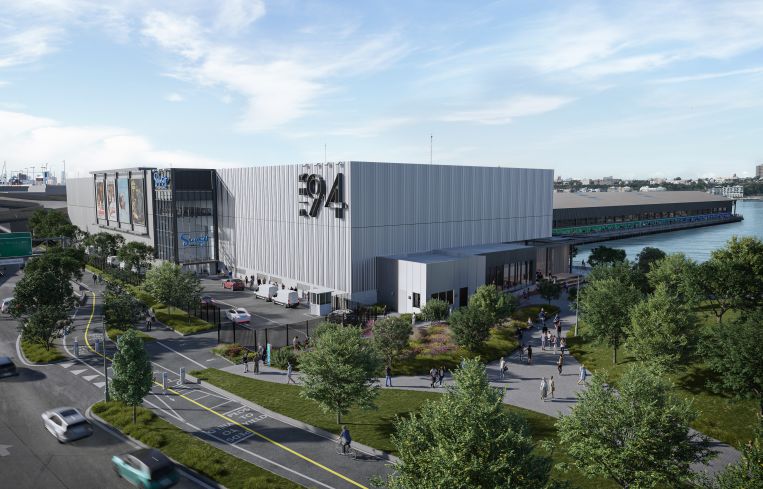Developers Plot Manhattan’s First-Ever Film Studio as Actors Remain on Strike
By Aaron Short August 31, 2023 1:30 pm
reprints
Most Hollywood creatives have been on strike this year, but New York is betting the entertainment industry will need state-of-the-art studio space minutes from Midtown in the near future.
Vornado Realty Trust, Hudson Pacific Properties and Blackstone are joining the city in a $350 million public-private partnership to build Manhattan’s first-ever production studio center on Pier 94 on the Hudson River, the city announced Tuesday.
The site, which will include a 250,000-square-foot campus with six soundstages, is expected to create 1,300 construction jobs and 400 permanent ones on the site and generate $6.4 billion within New York’s economy, according to city officials.
It aims to put studio space outside the outer boroughs — where soundstages have proliferated thanks to cheaper land — and in the heart of Manhattan, making it more convenient for stars than schlepping out to Queens.
“In many ways, I do think it’s a crown jewel for the city,” Melissa Román Burch, New York City Economic Development Corporation (EDC) chief operating officer, said. “New York City is rapidly becoming a true national and global destination for film, television and media content production, but we don’t rest on our laurels. We know it’s a competitive marketplace.”
Plans to remake the Far West Side piers have been swirling for 15 years, when the EDC awarded Vornado a 49-year lease for Pier 94 and the neighboring Pier 92 in 2008, with one headline touting, “A Project That’s Actually Happening: Vornado Redoing Pier 94.”
Vornado initially wanted to double the size of the pier and build a convention center that would rival the Javits Center. But the project stalled and the city determined in 2019 that Pier 92 was structurally unsound. Then the pandemic interrupted large-scale events from occurring at all.
Earlier this year, Vornado renegotiated its deal with the city and came up with a new proposal for a movie studio and a longer, 99-year lease, giving Pier 92 back to the city (some real estate leaders were surprised that the city gave Vornado a deal after it did little to fix up Pier 92 for the decade it leased the site).
Vornado would own 49.9 percent of the lease and be responsible for the site’s development, while its new partners, studio owner Hudson Pacific Properties, would own 25.6 percent and oversee the design while managing leases, and Blackstone’s real estate arm would own 24.5 percent.
“Our partnership with Blackstone, Hudson Pacific and the City of New York will solidify New York as a leading market for content production and studio space, create jobs, drive economic momentum, and deliver a host of amenities to the surrounding community,” Michael Franco, president and chief financial officer at Vornado, said in a statement. “Together we’ll raise the bar for one of New York City’s signature industries and breathe new life into a key waterfront site.”
The entertainment industry currently has little need for new studio space. The combined writers’ and actors’ strikes shut down dozens of productions starting in May, and shoots have not resumed at most of the city’s 60 registered production facilities that constitute almost 2 million square feet of production space.
Jeff Stotland, executive vice president of global studios for Hudson Pacific, believes that pent-up demand will materialize across the country once the writers’ and actors’ strikes are resolved, putting the Manhattan studio in a position to host new productions.
“Studios have seen firsthand that their success is largely reliant on continuing to produce original scripted content, and Los Angeles and New York remain the most sought-after markets for this production,” Stotland said. “We have strong conviction that the underlying fundamentals of content production will benefit the Sunset Pier 94 Studios project, as well as the rest of our growing studio platform.”
Other New York production studio owners welcomed the Manhattan-based project to the city’s mix, even as the writers’ strike stretched into its fifth month.
“The impact of the recent WGA and SAG-AFTRA strikes have been far-reaching, but we anticipate that industry demand will continue to grow once the strikes have been resolved,” Gina Argento, president and CEO of Broadway Stages, which has studio space in Brooklyn, Queens and Staten Island, said. “We are hopeful that any new and existing studios will also commit to supporting the local community in ways that are impactful and equitable.”
Strikes aside, studio space has boomed in recent years thanks to the proliferation of streaming services like Netflix and Apple that are hungry to create compelling content to win subscribers. But, that has started to turn as streaming services dealt with a saturated market while providers faced huge losses, leading to layoffs and halted productions to cut costs.
Studios also have to face the problems hitting much of the commercial real estate industry — rising interest rates, inflation, regional bank failures, declining values and dragging debt — making the market reeling even before the strikes.
“Production in the U.S. has halted at a time when the sector is under pressure to mitigate the secular decline in linear TV and show it can operate streaming platforms at a profit to mitigate linear decay,” Moody’s Analytics reported. “In a prolonged strike in which new theatrical Hollywood tentpole product is spread more thinly or runs dry, these companies could face earnings, cash flow and liquidity pressures.”
The Pier 94 site itself will soon be transformed regardless of the labor strife and streaming woes. Construction is expected to begin this fall as existing facilities next to the pier will be demolished for new soundstages and parking, while the pier’s warehouse will be turned into support space. The city will also be getting 25,000 square feet of waterfront space as well as an 1,850-square-foot community facility, public access to the pier, new public bathrooms, and new safety improvements to the Hudson River bikeway. The entire project is expected to be completed by the end 2025.



